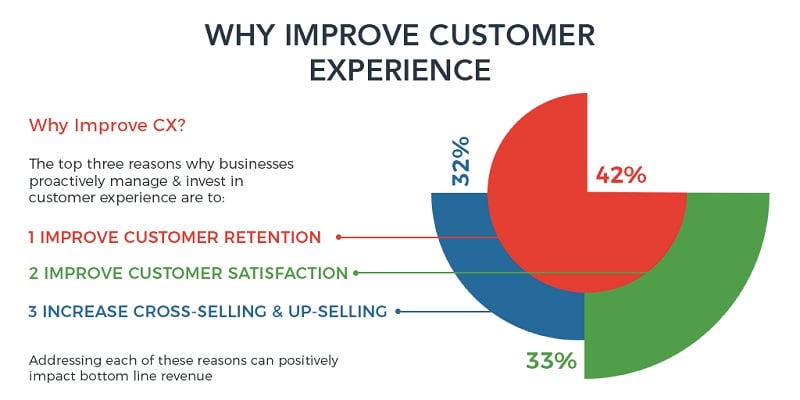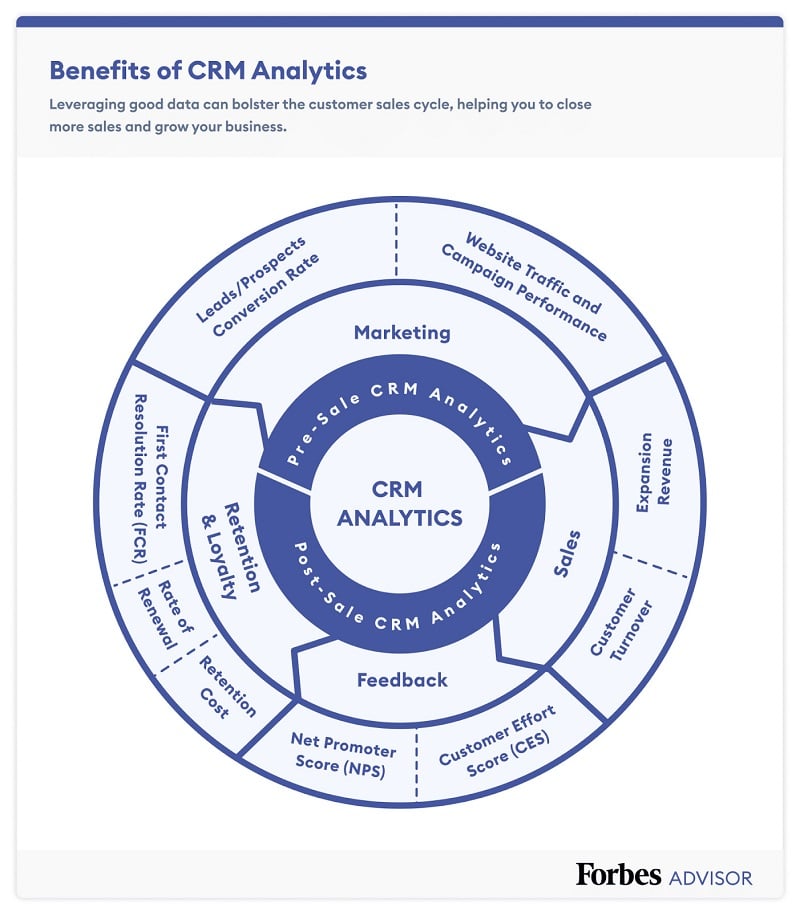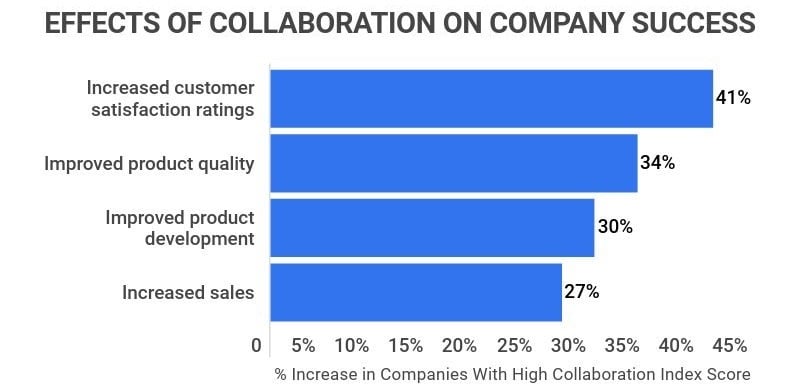4 Key Types of CRM – Operational, Analytical, Collaborative

Building strong customer relationships can be difficult if the right tools and principles are not in use. Organizations that maximize the potential of the best CRM software systems enjoy positive results.
CRM statistics show that CRM software can increase sales by up to 29% and boost sales team productivity by 34%. Plus, it can decrease the sales cycle by 8-14%.
Understanding the different types of CRM will help you convert leads into loyal customers and retain customers.
Let's get started.
Types of CRM Software
The CRM (customer relationship management software) you use depends on your organization’s needs and the best solution. Let's check out the best CRM software systems and how they can offer solutions to your customer-related issues.
1. Strategic CRM
Strategic CRM makes your customers the number one priority. A major benefit of CRM is long-term customer engagement to boost customer retention and foster customer loyalty.
Your number one tool is the information and data acquired from the customers. This rich information plays a vital role in identifying various needs and desires of your clients and the best way to offer value to your customer base.
Since it's a long-term process, and customer needs and wants are bound to change, strategic CRM ensures your organization is ready for any situation.
To be on top of your game, you must study new trends and identify customer requirements in different situations for seamless adaptation. When you keep your customers happy, they will always return to buy more products.
Strategic CRM increases your customer lifetime value (CLV) and reduces your customer acquisition costs (CAC) for a higher return on investment (ROI).

A simple example involves identifying communication channels that best suit your customer's needs and preferences. By leveraging such channels, you get these customers glued to your organization and willing to patronize you.
2. Operational CRM
An operational CRM system simplifies complex customer relationship processes. You can seamlessly improve your interactions with your customer and promote a fruitful relationship with an effective CRM process.
Activities like sales, marketing, and customer service are more effective and productive with operational CRM.
Operational CRM systems track, manage, and improve your customer lifecycle. They enable vital customer interactions such as self-service appointment booking or automatic follow-up emails designed to improve customer experience.

An operational CRM uses tools like sales force automation, marketing automation, and service automation to smoothen customer relationships.
Features of Operational CRM
Operational CRMs streamline major business processes such as sales automation, marketing automation, and service automation. Let's take a closer look at them.
Marketing Automation
Marketing automation helps to boost your brand and product awareness without the marketing team lifting a finger.
This tool uses client information to target unique customer segments via emails, texts, and digital ads to boost customer acquisition and increase customer retention.
Activities like purchases, website sessions, and landing page visits can trigger the marketing automation tool to respond and interact with customers.
This operational CRM feature helps to boost longer sales cycles by monitoring leads' progress and potential customers, tracking touchpoints, and sending automated follow-ups.

Sales Automation
Sales automation is an effective tool for automating your organization's sales process. Operational CRM helps to streamline business processes when dealing with organizations that experience a lot of repetitive tasks and linear sales processes.
As a CRM solution, sales automation analyzes customer data to meet customers’ needs and increase sales. Sales automation includes various CRM sales modules such as Quote-to-Order management, lead management, contact management, and sales forecasting.

Customer Service Automation
Customer service automation uses various tactics and tools to improve customer retention rates and build strong relationships. Services automation involves recognizing and creating solutions to customer and product issues, service level management, and healthy communication.
Customer service activities reduce because of automated processes.

For example, the Interactive Voice Response (IVR) system fosters customer satisfaction through fruitful communication between clients and pre-programmed computer systems.
Vital aspects of customer service automation include:
- Problem management.
- Interaction management.
- Customer call management.
- Service level management.
- Self-service features.
- Automated email responses.
- Live chat.
- AI-powered chatbots.
3. Analytical CRM
Leads are vital to every business because they are future customers. With analytical CRM, you can seamlessly analyze customer data to acquire vital insights.
An analytical CRM system tracks your leads’ movement through your sales funnel. Activities like capturing, interpreting, segregating, storing, reporting, and modifying customer data are necessary to understand how customers relate to your business.
With the derived information, you can do a proper assessment of marketing, sales, and customer service efforts to determine whether the process requires adjustments.

Through your assessment, you can come up with vital solutions and answers to questions like:
- What are the most frequent customer complaints?
- What are your customers’ preferred features and resources?
- What leads are likelier to convert?
- How fast does the support team resolve customer issues?
Analytical CRM uses data mining to analyze large sets of data. With this technology, data analysis is smoother and more effective than when a human is doing it.
If you want a detailed performance report like a sales history and customer service satisfaction report, you can have it in a jiffy with analytical CRM. Such reports allow you to identify the effectiveness of your customer service teams.
If your company is bent on improving its customer relationship management practices, your analytical CRM systems must function optimally.

Features of Analytical CRM
Let's talk about some features of analytical CRM that make it valuable to different business organizations.
Data Warehousing
As its name implies, a data warehouse is a secure location where you store massive amounts of data regarding sales, marketing, customer interaction, and more.
After acquiring relevant data, you can run data analysis and generate reports. These reports serve as a sure guide for your next move regarding customer-related issues.
Data Mining
You can begin data mining when you want to analyze data you acquired through various means. Proper data entry is vital to data mining if you want to convert complex data into meaningful information.
Data mining has different techniques like association, classification, and anomaly detection.
Online Analytical Processing (OLAP)
OLAP is a powerful CRM tech relevant for activities such as predictive planning, data discovery, capabilities for limitless report viewing, and complex analytical calculations.
4. Collaborative CRM
Teamwork makes the dream work. This quote is the foundation of collaborative CRM systems. The more various departments in an organization work together, the better their retention rate and customer experience.
A collaborative CRM system is relevant for businesses with multiple locations. They don't have to repeat the same process for the same result. Different organizations can share customer data to boost their customer-related activities.
The main objective of collaborative CRM is to boost customer experience via quality communication within an organization. Each department contributes to the nurturing of leads till they become loyal customers.

This CRM system is not common among small businesses. Large organizations are major beneficiaries of collaborative CRMs because they have various departments and skilled workers who can contribute.
Collaborative CRMs use different channels of communication to build seamless customer experience.
- Electronic Data Interchange (EDI).
- Email.
- Chat rooms.
- Web forums.
- Telephone.
- Fax.
- Voice over Internet Protocol (VoIP).
Features of Collaborative CRM
Let's dive a bit deeper into the vital features of collaborative CRM and see how it can smoothen the operations of various organizations.
Interaction Management
With interaction management, you can monitor every customer interaction and identify relevant touchpoints to exploit.
Identifying these touchpoints and facts helps you make informed decisions regarding changes and improvements to your customer service processes.
Channel Management
Channel management is vital to every organization’s customer-related activities. If a business can manage its contact channels, the sales team will have less work.
Through channel management, organizations identify suitable contact channels for various customers and exploit them to their advantage. This action boosts communications between prospects and customer service reps.
Which Type of CRM System Is Right For My Business?
CRM systems can improve your company's operations and customer relations. They differ in their makeup and functionality.
Identifying the ideal CRM system for your organization is a game changer. Your choice depends on your present or future needs.
The good news is that most CRM offers multiple solutions, and you can have various relevant features in one package.
Collaborative CRM. Best for Businesses with Linear Sales Processes.
You will find collaborative CRM relevant if your organization has branches in multiple locations. This CRM system is perfect for businesses with linear sales processes.
Collaborative CRM enables your marketing and sales reps to focus on customers rather than mundane tasks. Additionally, issues regarding sales, marketing, and customer support teams are managed with this CRM.
Operational CRM. Best for Automating Repetitive Tasks.
If your organization deals with repetitive tasks, an operational CRM is ideal. Organizations use it to integrate and automate their workflows in sales, marketing, and customer service.
Analytical CRM. Best for Account-Based Sales Organizations.
If your company is a service or account-based sales organization, the ideal CRM software system must have an analytical foundation. Analytical CRM comes with vital features like online analytical processing that helps to make insightful and data-driven decisions.
Strategic CRM. Best for Customer-Focused Organizations.
If your business vision is customer-focused, then a strategic CRM will go a long way in helping you achieve your dreams.
Explore Further
- What is a CRM Database? A Complete Guide
- CRM Implementation: 6 Steps For a Winning Strategy
- Key Components of CRM Process Every Clever System Should Have
- 14 CRM Best Practices to Claim a Higher ROI
- 19 Best Sales CRM Software in 2023
- 13 Best CRM Software Examples of 2023
- Compare CRM Software Costs of Top CRM Solutions (2023)